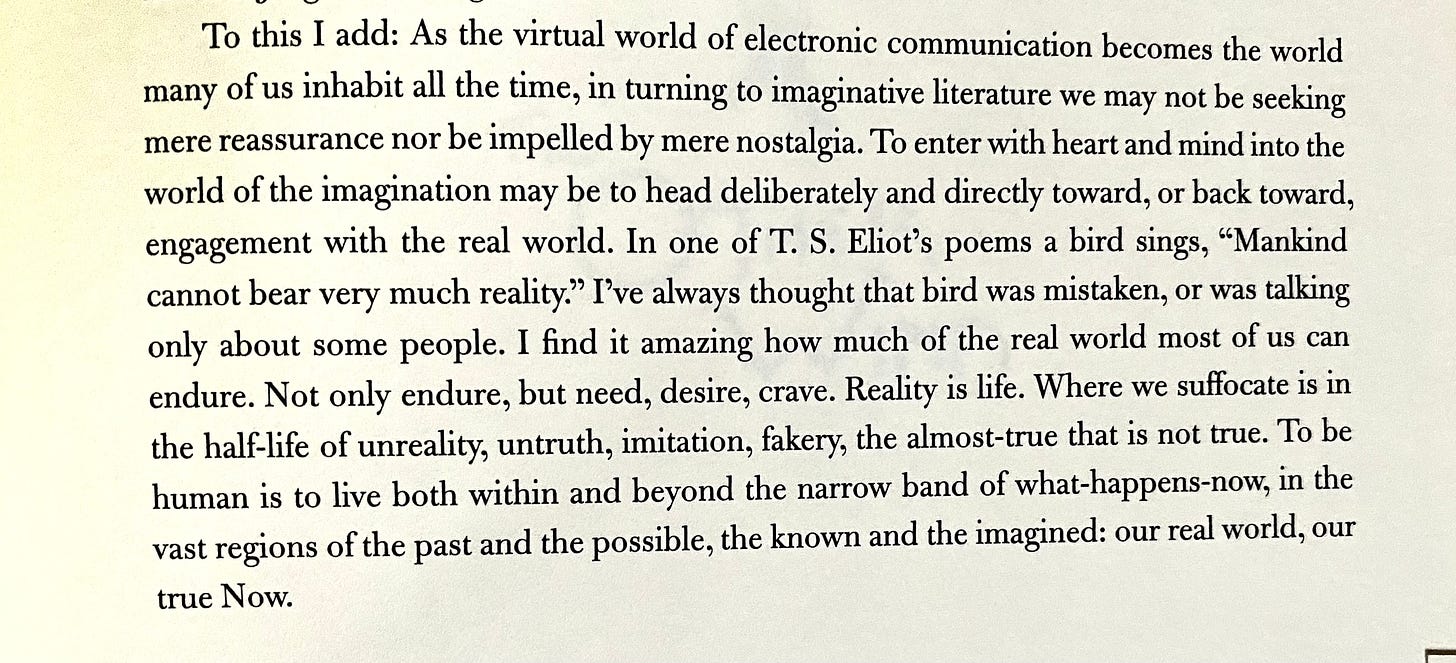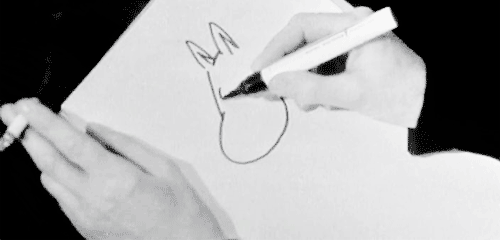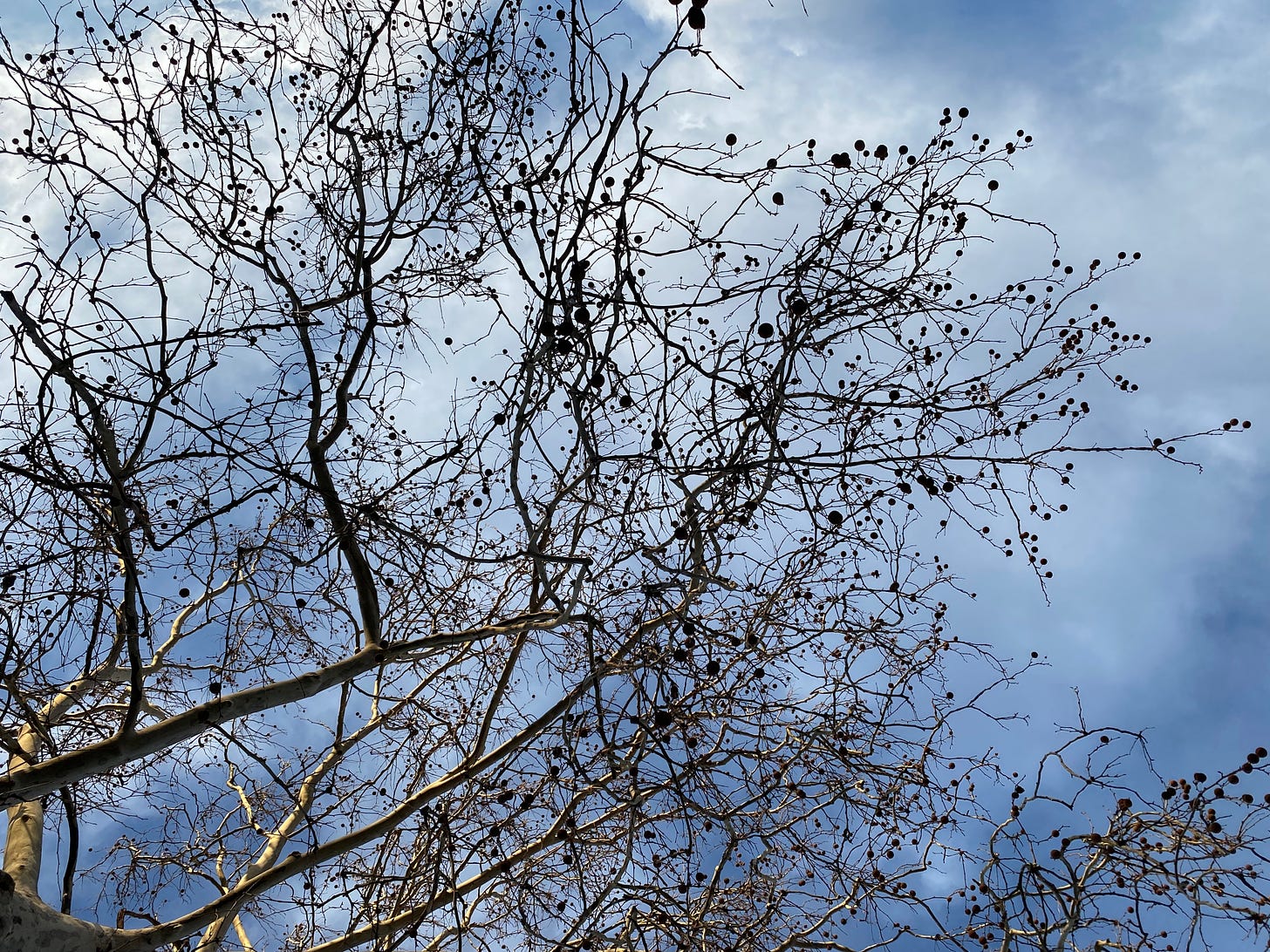To Enter The World Of Imagination Is To Head Back Toward The Real World
I am so sick of these AI weirdos
I recently finished rereading the ponderous anthology The Books of Earthsea: The Complete Illustrated Edition, a collection which includes lengthy afterwords by Ursula Le Guin following each of her stories. The collected novels and stories were long enough on their own that I was tempted to skip the extras. But as soon as I started on them I realized they were just as good as the stories themselves—a real treat.
These essays provide a fascinating look into the process of writing and publishing the kind of books Le Guin wanted to write and publish. At the time she first created the world of Earthsea there was little regard for women in the realm of fantasy, on the page or in stores. There was even less regard for protagonists of color, much less entire fictional worlds full of them. As Le Guin unpacks her journey from anonymity to the beloved status she held at the time of her death, it becomes clear that it’s a marvel her books ever got published at all.
While this may have soured her on certain men who were gatekeeping the world of fiction at that time, it didn’t sour her on the power and importance of fiction itself. In one of the collection’s final inserts, the transcript of a speech she gave to a children’s literature conference, she says:
The anthology was published in late 2018, a few months after Le Guin’s death, and her words ring even more true just five years later. We are barreling into an age that is profoundly anti-social and anti-artistic, and I suspect that those phenomena are linked.
We can curate so much of our lives, as spent on the internet, that we become ill-prepared for the messy and surprising nature of the real, the interpersonal, the mortal. Outside the lit-up box we stare into, almost nothing is within our control; that prospect is only so daunting because we have the unreal to compare it to at all hours of the day as no generation in human history has. We are so much more capacious and imaginative than we know, and reclaiming this truth—and cultivating its natural fruits—are desperately important.
The easy answer is to blame ourselves for becoming addicted to the safe world within our devices, but that ignores the fact that this digital prison has been created for us and is now propped up by forces far greater than what an individual boycott or “responsible” habits can overcome.
This endlessly digitized world sets us up for all kinds of errors in judgment. It’s well-documented that social media use tends to make people meaner, or at least allows them to be. But it has also begun to corrode our understanding of the labor and effort required to make things—clothing, meals, art, the written word, you name it.
I know little about professional cooking and even less about clothing. But I am close to militant about the intrinsic and extrinsic value of art, especially the written kind.
The human act of writing and reading fiction is a remarkable one. To pick up a novel is to engage in something like a collective hallucination. You look at markings on the pressed remains of dead trees and are guided through the process of imagining people and places and events and creatures that never existed, could never exist. And anyone else can do the same, though their hallucinations—were we able to capture them—would look quite a bit different from yours. (At least until the book becomes a movie, and then that’s most of what any of us will ever picture again.)
This act of fantasizing about that which never was somehow grounds us more firmly in the real. By that I mean that the experience of shared imagination makes us better equipped to understand that which actually exists, first and foremost by strengthening and deepening the emotional lens through which we engage with the world. As I’ve written before, I don’t believe there is a single objective “real” world out there; the way we experience anything is conditioned by everything from the sensory organs we possess to the material, economic forces that govern our lives. I experience the world differently from my dog, or a hummingbird, or a pistol shrimp; none of those perceptions are any more “real” than any other. But we don’t have to transcend species to understand this. I also experience the world differently from synesthetics and the deeply religious and the significantly richer and significantly poorer than myself, in very dramatic ways.1
Yet all these people can be united by the act of engaging with the same work of art, even if their interpretations and experiences vastly differ. What’s more, I think we all benefit each time a person is forced to slow down, to put away distraction, and to fully immerse themselves in a story that flexes (and thereby strengthens) their imagination.
I am always grateful to find a book good enough that I can read it indefinitely without feeling tempted to pick up my phone. Like so much else—writing, for example—this habit can certainly be trained, which is a more productive approach than simply wishing for the muse to strike or The Perfect Novel to appear in your hands. But it also feels important to note those moments when you really are struck by a book, or gripped, or flabbergasted, or whatever else, without having to try especially hard. I think we all want to be spellbound to some degree or other, and that requires quality of either storytelling or attention (or preferably both), attributes that the relentless refresh of ideas and information as conveyed by social media are diametrically opposed to. (In his The Convivial Society newsletter, L.M. Sacasas calls this “reading as counter-practice,” which I think is handy.)
Again, these flights of imagination and attention are not just escapism (although that’s a perfectly fine reason to read, too); they can also guide us through the act of living in the real world. I read a story about two men who travel to the land of the dead to capture another who has ripped a hole in the world by cheating death and it makes me certain that life’s finitude is what gives it any meaning at all. I read a story about a professor who travels to a foreign land to put his skills to use as a dynamiter, ultimately giving his life in the fight against fascism, and it makes me wonder what I’d be willing to give my life for. I read a story about a man and his dog trying to hold onto the pieces of their lives nine years after the end of the world and it makes me think about how alone and precarious we all seem even though the world remains mostly intact.
Le Guin’s Ged the Archmage and Hemingway’s Robert Jordan and Peter Heller’s Hig don’t exist, as such, anywhere we could reach out and touch them. But they exist on the page, and that’s a real enough existence to impact and influence people here on this plane. Reading fiction is not an escape from real life, but preparation for it.
Despite this, or perhaps because of it, some of the world’s most sinister shitheads and their tedious underlings are making their stand against the creation of new worlds and ideas. There is a growing set of very vocal and powerful people who seem to believe, implicitly or explicitly, that the purpose of art is simply to communicate information. If they read, they don’t read fiction; they read what I mentally refer to as “airport books”: The 48 Laws of Power and 12 Rules for Life and The 7 Habits of Highly Effective People and all the other numerically titled sorts of texts that promise to help you sort your life out and dominate the world.2
What kind of a life can this approach to reading really prepare us for? These are the same people heralding the rise of AI imaging and text generation as a grand step forward for humanity. Finally, we have removed the pesky artist from the art!
There’s nothing wrong with reading for the sake of gaining useful information, of course, just as there’s nothing wrong with playing around with web tools on the computer in the hopes of making something that looks cool. But to reduce an entire artistic medium to its most basic utilitarian purpose seems to me to miss the purpose of making or experiencing art at all. The airport book weirdos and the AI weirdos seem to be genuinely annoyed by the idea of creative expression, by the act of creating the unreal to better understand the real. By the notion that there are people who are moved to do beautiful things with no profit motive behind them.
And to the extent that there is a profit motive, when people make art professionally, the pro-AI crowd is doing its best to put paid to that, too. If a human artist makes your show’s visual effects, you have to pay them, and you might even have to pay them union wages. If a digital scraping tool that can collate and reproduce the average landscape of 10,000 other shows at once makes your show’s visual effects, you don’t have to pay it a thing.3 The Writers Guild of America is on strike as of yesterday morning over issues just like this. From their bargaining proposal:
Regulate use of artificial intelligence on MBA- covered projects: AI can’t write or rewrite literary material; can’t be used as source material; and MBA-covered material can’t be used to train AI.
The studios rejected this demand, among others. Corporations don’t want to foreclose on the possibility of creating content with the push of a button, thereby eliminating countless jobs and subjecting us all to a lifetime of slop. This writers’ strike feels like a preview of the coming inter-industry onslaught of automation and dehumanization, and a blueprint for the only viable strategy we have to fight it.
I don’t want to live in that grim, gray future. I have trouble enough coping with its early manifestations in the present. I don’t want waves and waves of people to become destitute because people rich enough to have stripped themselves of all that approximates a soul get to decide that the creative impulse is not worth having.
E.B. White once wrote that “A book is a sneeze.” I once took that to mean he thought it was easy. It’s not that: it’s that making art is something you can’t help but do. I am fighting for a world that nurtures and celebrates that creative urge, whether it is “worth” anything or not. Without it, we may lose touch entirely with what’s real and necessary.
Thanks, as always, for reading. I’ll talk to you next week.
-Chuck
PS - If you liked what you read here, why not subscribe and get this newsletter delivered to your inbox each week? It’s free and always will be, although there is a voluntary paid subscription option if you’d like to support Tabs Open that way.
A friend recently told me that before his girlfriend came to visit his hometown of Seattle, she had never seen a mountain before. Do she and I see the world the same way? I doubt it!
No one ever got filthy rich following these texts to the letter but plenty of people have gotten filthy rich writing them. Really makes you think.
Ironically, these anti-fiction, pro-AI art people—whose Venn diagram with “rabid Elon Musk fans” is a perfect circle—are very committed to the idea that they are the real free thinkers, the radicals, unfettered by ideology or bias, observing the world as it truly is and pitying (or mocking) the rest of us. For all their free thinking they don’t seem to question why it is that their worldview happens to be identical to that of the richest man on Earth, a man who helps shape and dictate government policy as his companies dodge taxes and hoover up subsidies from that same government. A man who styles himself the savior of humanity while he actively fights to put people out of work, drive wages down, and relax the safety standards that otherwise keep people alive in factories and cars.










My favorite line: “Reading fiction is not an escape from real life, but preparation for it.” Fuck this AI shit.